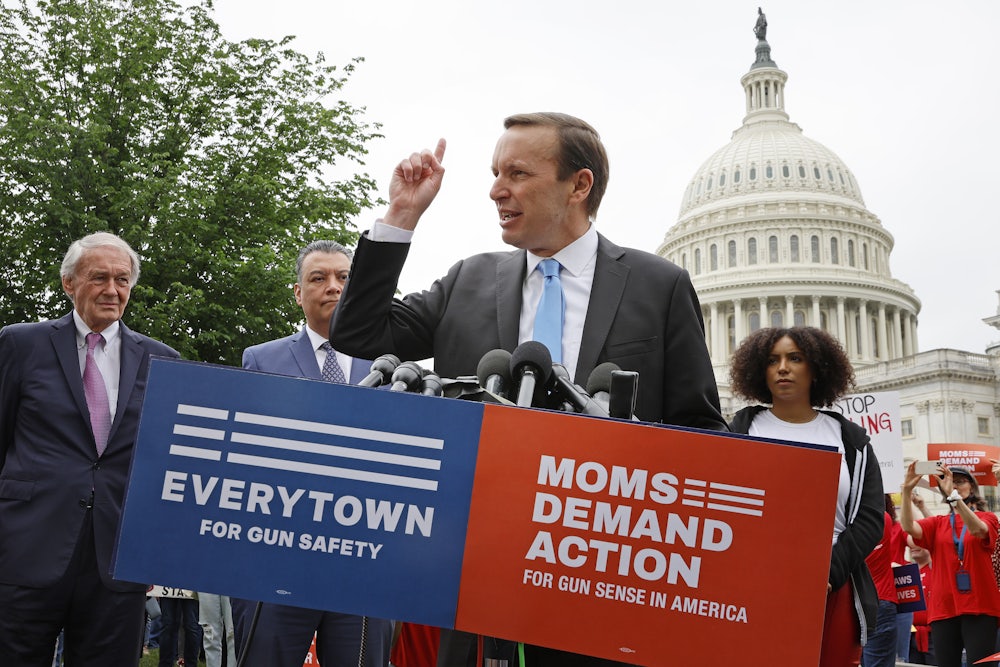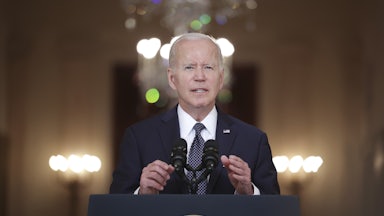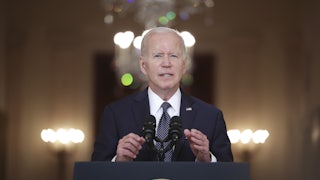Throughout his political career, President Joe Biden has used his ability to empathize with the grief-stricken a means of connecting with people. In recent years, he has paired his knack for consolation with moral indignation; he predicated his presidential race on the racist violence at the white supremacist rally in Charlottesville, Virginia, in 2017.
On Thursday evening, Biden employed that twinning of grief and outrage in a prime-time speech denouncing recent incidences of gun violence and calling on Congress to pass significant gun safety legislation. The president’s speech came after several horrific weeks of unspeakable violence: a racially motivated shooting at a grocery store in Buffalo, New York, that left 10 dead; the worst school shooting in nearly 10 years in Uvalde, Texas, which saw 19 children and three teachers killed; and a Wednesday shooting in a Tulsa, Oklahoma, medical center that killed four people.
“After Columbine, after Sandy Hook, after Charleston, after Orlando, after Las Vegas, after Parkland, nothing has been done,” Biden said, listing previous mass shootings that shocked the country. “This time, that can’t be true. This time we must actually do something.”
In his speech, Biden called for Congress to approve measures including an assault weapons ban; recognizing the political infeasibility of that notion, he also suggested raising the age limit to buy assault weapons from 18 to 21, expanding background checks, removing legal immunity for gunmakers, implementing red flag laws, and enacting safe gun storage laws. Most of these ideas will not garner enough Republican support to pass, but there may be some areas of common ground.
Congress has tried and failed to pass meaningful gun safety legislation in the wake of previous mass shootings, although some states have taken actions to address gun violence on their own. But some advocates who have been working to promote gun safety legislation at the federal and state level have expressed optimism that this time might be different. Noah Lumbantobing, a spokesperson for March for Our Lives, an organization founded by students who survived the school shooting at Marjory Stoneman Douglas High School in Parkland, Florida, in 2017, noted the importance of public sentiment in an interview. He said that roughly 500 marches were planned in addition to the upcoming march in Washington, D.C., on June 11, to rally for action on gun safety. “It seems like a very, very big political window right now in terms of Americans’ outrage,” Lumbantobing said. “There’s no community in the country that doesn’t experience gun violence.”
Many mass shootings in the country do not become national news. Since the mass killing in Uvalde on May 24, there have been 20 mass shootings in the United States, according to the Gun Violence Archive, which tracks events with at least four people injured or killed, not including the shooter. Seventeen people have been killed, including the four victims in the shooting at a medical center in Tulsa, Oklahoma, on Wednesday. As of Thursday, the archive has recorded 233 mass shooting incidents in 2022 alone. But everyday gun violence can scar lives even if it doesn’t qualify as a mass shooting: On June 2 alone, the Gun Violence Archive tracked 81 shooting incidents. Behind those statistics are lives lost or forever changed; for example, three of those deaths occurred in Ames, Iowa, on Thursday, where a man shot and killed two women in a church parking lot before killing himself.
Nicole Golden, the executive director of Texas Gun Sense, said that the mood of urgency reflected the moment but had also been building during years of activism. “I’m sensing a whole new level of outrage and sweeping support for gun violence prevention from members here in the state and across the country,” Golden said. “But all of the mass shootings and everyday violence that doesn’t always hit national headlines have all built momentum over a long period of time. The movement has grown and grown.”
Indeed, many gun safety measures have widespread support among the public. A Morning Consult poll taken after the Uvalde shooting found that 65 percent of all voters support stricter gun control laws—up five percentage points from just days earlier, when the question was asked after the Buffalo shooting. The poll also found that nearly 90 percent of all voters, including the vast majority of Republicans, support background checks on all gun sales. Recent polling has also shown support for red flag laws, which allow the temporary removal of firearms from people who have been deemed a threat to themselves or others. (Red flag laws have thus far been enacted in 19 states, including Republican-led Florida.)
Even though Congress was in recess this week, members of both chambers began to take action related to gun safety legislation. The House Judiciary Committee on Thursday approved along partisan lines a package of gun safety bills, including raising the age limit to purchase some semiautomatic rifles from 18 to 21, banning high capacity magazines and “bump stocks,” further regulating “ghost guns,” and incentivizing safe storage. In his opening statement, House Judiciary Committee Chair Jerry Nadler said that the bills included “overwhelmingly popular proposals that will help us to scale back the scope of gun violence in the United States.”
The legislation does not include an assault weapons ban, although Speaker Nancy Pelosi pledged that the House would “soon hold a hearing” on such a ban. Separately, House Majority Leader Steny Hoyer set a vote next week on a red flag bill and legislation to encourage states to enact their own red flag laws.
But whatever legislation passes in the House will undoubtedly be blocked in the Senate. “What we are doing here is just designed to appeal to Democratic primary voters,” Representative Jim Jordan, the ranking member of the Judiciary Committee, said during the markup for the gun safety package on Thursday. (Punchbowl News reported on Thursday that a group of House Democrats, many of whom are in competitive districts, wrote a letter to House leadership asking that the separate components of the package be split up and voted on as standalone bills.)
Any efforts to approve the House-passed legislation in the Senate would be hindered by the filibuster, which requires bills to reach a 60-vote threshold to advance. Typically, this would mean that 10 Republican votes would be necessary to surmount this challenge. But even without the filibuster, Democrats likely could not muster 50 votes of their own to support a more sweeping measure like an assault weapons ban.
A bipartisan group of senators has met virtually in recent days to discuss a potential compromise measure on gun safety. The conversations are being spearheaded by Democratic Senator Chris Murphy, one of the leading gun control advocates in the Senate, and GOP Senator John Cornyn of Texas. Democratic Senator Richard Blumenthal and Republican Senator Lindsey Graham are working on red flag language; the two had previously worked on the issue together in 2019.
Shannon Watts, the founder of Moms Demand Action, expressed cautious optimism about the negotiations in a statement to The New Republic. “We’re encouraged to see real bipartisan negotiations going on in the Senate right now—but it isn’t about our hope that something gets done, it’s our expectation that lawmakers do the right thing,” Watts said.
Lumbantobing told The New Republic that the discussions in the Senate were encouraging, even if future legislation was not as far-reaching as activists may hope. “As long as we’re getting something and we’re saving lives, we will be encouraged. But it’s important for us that universal background checks, red flag laws—these things are the floor. These will not end the gun violence crisis,” Lumbantobing said. “We’ll be happy with it, but we’re clear-eyed that it’s the beginning. It’s the floor, it’s not the ceiling.”
Murphy wrote in an opinion piece for Fox News on Thursday that he understands that “in order to find common ground, I will need to agree to a smaller set of reforms than I would prefer.” (Murphy’s choice of outlet for this op-ed further underpins his willingness to appeal to conservatives in crafting some kind of compromise.) The senator expressed optimism about the prospects of reaching a deal, saying on MSNBC on Thursday that Senate Minority Leader Mitch McConnell was being kept apprised of negotiations and that he hoped “we’ll have something in the end that [McConnell] can support.”
Lumbantobing said that even if McConnell was not on board with any legislation, other Republicans appeared open to discussions. “We don’t trust Mitch McConnell. I think that’s the simple fact of it. But members of his caucus have been much more receptive than they have been in the past to commonsense gun safety solutions,” Lumbantobing said. “We’re encouraged that we’re starting from a place of common ground.”
In an interview with The Washington Post published on Friday morning, Murphy acknowledged that the Senate still does not have the votes for universal background checks. He has raised the prospect of deals on tightening background checks, expanding mental health resources, and incentivizing states to enact their own red flag laws.
“I’ve failed a lot in these negotiations. But these talks feel different, because I think members on both sides realize that there’s a real risk to the legitimacy of government if we don’t act,” Murphy told the Post.
In a sign that both parties are taking the issue seriously, Cornyn told Politico in an interview that if the Senate cannot reach a deal, “it will be embarrassing.” “It would feed the narrative that we can’t get things done in the public interest,” Cornyn said. “I don’t believe that narrative, I believe we can get a bipartisan deal done in the public interest.” However, the Texas senator also said that he was “not talking about restricting the rights of law-abiding citizens under the Second Amendment,” but rather “identifying people with criminal and mental health problems that are a threat to themselves and others.”
Golden of Texas Gun Sense, which encourages action on the statewide and the federal level on a bipartisan basis, said that she was encouraged to see a senator from her home state taking action on this issue.
“I think it’s time to throw everything on the table by everyone [that’s] willing to do that. So it’s encouraging. We’re still watching and listening to see what action will actually be taken,” Golden said. “But I think if there was ever a time for anybody, any leader to step up and be part of the solution, then this is it.”










